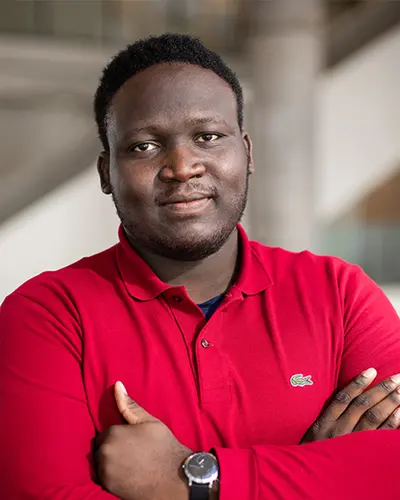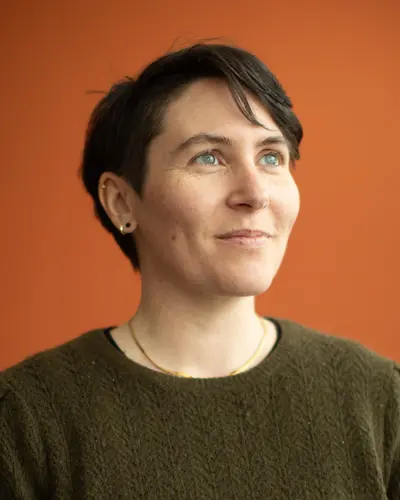AI Insights for Policymakers
The AI Insights for Policymakers Program provides a platform for policymakers and scientists to have timely and meaningful interactions to inform their thinking around AI and policy.
The AI Insights for Policymakers Program provides a platform for policymakers and scientists to have timely and meaningful interactions to inform their thinking around AI and policy.

The AI information space is noisy, often highly technical, and full of competing claims and vested interests. Finding reliable, independent and, above all, relevant insights is challenging. This rings especially true for policymakers who are grappling with how best to approach, regulate or leverage AI for the public interest despite having limited access to technical AI expertise and no clear mechanism to engage with scientific experts.
The AI Insights for Policymakers Program addresses this gap by providing a platform for policymakers and scientists to have timely and meaningful interactions on key issues. Ultimately, we seek to bolster evidence-based policies across Canada by enabling policymakers to tap into the breadth and depth of the Canadian AI ecosystem’s knowledge.
Through a combination of "office hours" with the expert group, as well as more in-depth policy feasibility testing exercises, the AI Insights for Policymakers Program will connect policymakers with relevant experts to inform their thinking around AI and policy.
We recruited a diverse group of 12 AI experts with wide-ranging expertise, led by two co-chairs from the Canadian AI scientific community.
The primary mandate of the Expert Group is to provide targeted technical and socio-technical advice. Drawing on their expertises, they will provide advice and relevant knowledge to policymakers at all levels of government on specific challenges.
Additionally, the AI Insights for Policymakers Program is led by a secretariat based out of Mila and CIFAR, and can draw on experts in the broader Canadian AI ecosystem on a timely basis.
The AI Insights for Policymakers Program organizes free and independent in-person or virtual office hours, as well as two in-person sessions in different cities across Canada. Through the office hours, policymakers have the chance to sit down with the expert group made up of Canadian AI scientists to openly discuss their challenges relating to AI and Policy, helping them build their thinking around complex issues.
As AI-related policy initiatives ramp-up across Canada, the AI Insights for Policymakers Program will offer policy feasibility testing services to ensure more robust AI policies, reviewed through a technical lens.
If you are interested in bringing a draft policy proposal to the expert group, contact us by email.


Dr. Alissa Centivany is an Assistant Professor in the Faculty of Information and Media Studies at the University of Western Ontario working on technology policy, law, and ethics. She holds a PhD in Information and a JD specializing in intellectual property and technology law. Prior to joining Western, Dr. Centivany was a Microsoft Research Fellow at the Berkeley Center for Law and Technology, University of California-Berkeley School of Law, and a researcher at the Centre for Innovation Law and Policy, University of Toronto Faculty of Law. She was also an instructor at the University of Toronto and University of Michigan iSchools.
Dr. Centivany co-directs the Starling Centre for Just Technologies & Just Societies, co-chairs the AI Insights for Policymakers Program (AIPP), is co-founder and executive director of the Canadian Repair Coalition, is a member of the Rotman Institute of Philosophy, and is a scientist delegate in the inaugural Science Meets Parliament - Ontario program. Dr. Centivany has provided expert testimony before the Canadian House of Commons and Senate and is an active participant in Canadian policy consultations related to emerging technologies. Her expertise is also recognized internationally; she has presented her work before the G20 and has participated in U.S. and EU consultations.
Centivany regularly shares her work with public audiences through news media interviews with the CBC, Globe & Mail, Toronto Star, The National, Global News, The Agenda, and others. Her work is motivated by interdisciplinarity, curiosity, and care. In her spare time, she makes and enjoys art, tends to living things, plays pinball whenever possible, and occasionally (secretly) co-hosts a late-night college radio show.

Kevin Leyton-Brown is a professor of Computer Science and a Distinguished University Scholar at the University of British Columbia. He holds a Canada CIFAR AI Chair at the Alberta Machine Intelligence Institute and is an associate member of the Vancouver School of Economics. He received a PhD and an M.Sc. from Stanford University (2003; 2001) and a B.Sc. from McMaster University (1998). He studies artificial intelligence, mostly at the intersection of machine learning with either the design and operation of electronic markets or the design of heuristic algorithms.
He has co-written over 175 peer-refereed technical articles; his work has received over 30,000 citations and an h-index of 68. He is a Fellow of the Royal Society of Canada (RSC; awarded in 2023), the Association for Computing Machinery (ACM; awarded in 2020), and the Association for the Advancement of Artificial Intelligence (AAAI; awarded in 2018).

Ulrich Aïvodji is an assistant professor of computer science in the Software and Information Technology Engineering Department of the École de technologie supérieure (ÉTS) in Montréal. He also leads the Trustworthy Information Systems Lab (TISL).
Aïvodji’s research areas are computer security, data privacy, optimization and machine learning. His current research focuses on several aspects of trustworthy machine learning, such as fairness, privacy-preserving machine learning and explainability.
Before his current position, he was a postdoctoral researcher at Université du Québec à Montréal, where he worked with Sébastien Gambs on machine learning ethics and privacy.
He earned his PhD in computer science from Université Paul-Sabatier (Toulouse) under the supervision of Marie-José Huguet and Marc-Olivier Killijian. He was affiliated with two research groups at the Systems Analysis and Architecture Laboratory–CNRS, one on dependable computing, fault tolerance and operations research, and another on combinatorial optimization and constraints.

Glen Berseth is an assistant professor in the Department of Computer Science and Operations Research (DIRO) at Université de Montréal and a core academic member of Mila – Quebec Artificial Intelligence Institute.
He is a Canada CIFAR AI Chair and co-directs the Robotics and Embodied AI Lab (REAL). He was formerly a postdoctoral researcher at Berkeley Artificial Intelligence Research (BAIR), working with Sergey Levine.
Berseth’s previous and current research has focused on solving sequential decision-making problems (planning) for real-world autonomous learning systems (robots). More specifically, his research has focused on human-robot collaboration, reinforcement, and continual-, meta-, multi-agent and hierarchical learning.
He has published in the top venues in robotics, machine learning and computer animation. He teaches a course on robot learning at Université de Montréal and at Mila, in which he covers the most recent research on machine learning techniques for creating generalist robots.

Prof. Samuel Dahan is the Founder of OpenJustice, an open-source platform and community that provides no-code development tools, and hosting infrastructure for legal AI applications, enabling users to embed legal reasoning into language models. He is also the Head of Deel Lab, Deel’s research division dedicated to global employment policy and HR technology. He has spearheaded the development of a dozen AI projects, including the Deel AI Classifier, MyOpenCourt, and OpenJustice.
Dahan is an Associate Professor at Queen’s University Faculty of Law, the Director of the Conflict Analytics Lab at Queen’s, and holds visiting faculty positions at Cornell University, Paris Dauphine University, ENA, and Harvard University.
His previous roles include serving as a Cabinet Member at the Court of Justice of the European Union, Deel Chief of Policy as an Advisor for the EU Commission on financial aid programs in Eastern Europe, as a faculty affiliate at the Harvard Program on Negotiation, and Conflict Resolution Consultant at IRENE-ESSEC. He also clerked for the French Administrative Supreme Court (Conseil d’État).

Dr. Rozita Dara is an Associate Professor at the School of Computer Science, and the co-Director of Artificial Intelligence for Food (AI4Food), at the University of Guelph. Dr. Dara has established an interdisciplinary research program that spans applied artificial intelligence and data and technology governance, with a particular focus on agri-food systems. She has also spearheaded several initiatives related to digital agri-food at both the global and national levels. These initiatives include agri-food data governance and trustworthy artificial intelligence, data and legal interoperability in agri-food, and enhancing automation in agri-food practices.
Dr. Dara’s agri-food automation projects include the development of advanced decision support systems, digital twin technologies, and innovative AI applications aimed at monitoring and predicting disease, crop production and harvesting, and food safety monitoring and regulatory compliance.

Audrey Durand is an Associate Professor in Computer Science and Software/Computer/Electrical Engineering at Université Laval and an associate academic member of Mila — Quebec Artificial Intelligence Institute.
Durand holds a Canada CIFAR AI Chair and leads the axis on "Methods of Artificial Intelligence and Data Processing" at the Institute Intelligence and Data (IID) of U. Laval. Her research is focused on interactive learning, where the learning model shapes and is shaped by its data collection or exposure process. This includes reinforcement learning, bandits, active learning, partial monitoring, and continual/incremental learning with feedback loops. She is also interested in leveraging interactive learning in scientific applications, with a focus on health science.

Dr. Hadis Karimipour is the Canada Research Chair (Tier II) in Secure and Resilient Cyber-Physical Systems, and Associate Professor at the University of Calgary. Her pioneering research applies AI, machine learning, and deep learning to secure critical infrastructure, IoT, and operational technology, addressing threats identified in Canada’s National Cyber Threat Assessment.
She has published over 140 peer-reviewed works with more than 8,000 citations, placing her among the top 2% of globally cited researchers, and has secured nearly CAD 9 million in funding. Dr. Karimipour’s numerous accolades include the IEEE ComSoc Early Achievement Award, APEGA Early Accomplishment Award, Top 40 under 40 by Avenue Magazine, ASTech Award in AI/ML Advancement, Canada’s Top 100 Most Powerful Women, and the Top 25 Women of Influence Award. She serves on national and international committees, is Associate Editor for leading IEEE journals, and is a recognized advocate for diversity in STEM through leadership and mentorship initiatives.

Hugo Larochelle is the scientific director of Mila and an Adjunct Professor at the Université de Montréal. His academic research on the foundations of deep learning has contributed several conceptual breakthroughs found in modern AI systems. Previously, he was Principal Scientist in the Google DeepMind team in Montreal, and has also been Associate Professor at the University of Sherbrooke.
Through the years, he has played an active role in shaping the AI scientific community, including serving on the boards for the NeurIPS and ICML conferences, two top academic conferences for the field of AI, and co-founding the Transactions on Machine Learning Research journal.

Reihaneh Rabbany is a Canada CIFAR AI Chair and Assistant Professor in the School of Computer Science at McGill University, as well as a core faculty member at Mila – Quebec AI Institute. She received her PhD in Computing Science from the University of Alberta, and prior to joining McGill was a postdoctoral fellow in the School of Computer Science at Carnegie Mellon University.
Her research lies at the intersection of network science, machine learning, and data mining, with a focus on developing methods for analyzing large-scale, interconnected, temporal, and multimodal data. She applies these techniques to address pressing societal challenges, particularly the health and safety of online spaces. Her work spans detecting and mitigating misinformation, analyzing polarization and online discourse, combating human trafficking through AI-driven tools, and modeling epidemic dynamics using mobility and network data.

Frank Rudzicz is a Full Professor at Dalhousie University, original faculty member at the Vector Institute for Artificial Intelligence, status professor at the University of Toronto, Killam Memorial Chair, and Canada CIFAR Chair in Artificial Intelligence.
His work is in machine learning in healthcare, especially in natural language processing, speech technologies, and AI safety. His students have founded several companies in AI and Health that have had successful exits, including Winterlight Labs and Mutuo Health Solutions. His research has appeared in popular media such as Scientific American, Wired, CBC, and the New York Times, and in scientific press such as ACL, NeurIPS, JAMA, and Nature.

Dr. Jinqiu Yang is an Associate Professor at Concordia University, Canada, where she leads the O-RISA Lab. Her research focuses on AI safety and responsible AI, advancing robust LLM-based code generation and the reliability of life-critical systems like autonomous vehicles. She collaborates with industry leaders including Google, IBM, and Ericsson, and serves on program committees for top conferences (ICSE, FSE, ASE) and as Associate Editor for TOSEM and EMSE. Her work has earned recognition such as the ACM Distinguished Paper Award and IBM’s Project of the Year Award.